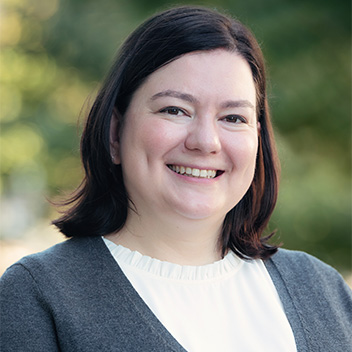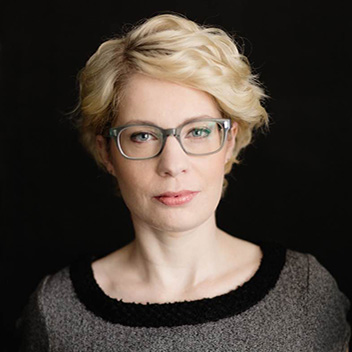
Two York University researchers have received research awards from the Government of Canada’s New Frontiers in Research Fund (NFRF) special call for innovative approaches to research in the pandemic context.
Professors Natalia Balyasnikova (Faculty of Education) and Heidi Matthews (Osgoode Hall Law School) are the nominated principal investigators on the funded collaborative projects, which were announced earlier in April.
“During the pandemic, York University’s community of researchers have demonstrated creativity and ingenuity in pursuing research and scholarly activity despite many personal and professional challenges,” says Amir Asif, vice-president, research and innovation. “I am delighted to congratulate Heidi Matthews and Natalia Balyasnikova for their successful applications to the New Frontiers in Research Fund’s Special Call on innovative approaches to research in the pandemic context. Both research proposals identify novel methods for conducting community and field-based research and have the potential to transform how future research is undertaken in the fields of education and public policy."
PhoneMe app: An innovative research approach to community literacy

Balyasnikova is the principal investor on the “PhoneMe app: An innovative research approach to community literacy” project. She will work with co-principal investigator Claire Ahn, assistant professor of education at Queen’s University and co-applicant Kedrick James, associate professor of teaching at the University of British Columbia. They will advance the PhoneMe project, a public digital platform featuring place-based poetry recorded on mobile phones.
Launched in 2017 as a community literacy research initiative and a digital map showcasing diverse site-specific poetic practices, the in-person work on the project was paused in 2019 due to the pandemic. Research activities were shifted online and in 2021, the research team launched a free PhoneMe mobile app that makes poetic data generation a user-driven autonomous process.
The PhoneMe app: An innovative research approach to community literacy project will evaluate the effectiveness of such mobile applications in the research of community connectedness in the time of social isolation and distancing. It will train diverse participant groups in generating multimodal data via the PhoneMe app to express their values related to places and spaces in their communities. The project will address the disruptive effect of COVID-19 on active community-engaged research and explore potential applications of mobile technology in qualitative research.
By creating opportunities for the community to draw on their own literacy practices, record poems in-situ, and share them on an interactive digital map, PhoneMe project addresses issues of self-representation in connection to the community spaces. In its first iteration, the project was carried out through researcher-led workshops and integrating data into an interactive digital map. In its current stage, the PhoneMe app places emphasis on user-generated content. It blurs the researcher/research participant divide and creates a unique inclusive space of digital dialogue and knowledge exchange in times of social isolation.
The project will create inclusive research protocols that deepen community leadership in this process and will effectively transform research into a process of community self-determination. The multimodal, user-generated data could be accessed by interdisciplinary groups researchers and research participants, expanding this research across disciplines.
Community Science and Accountability for Canada's Colonial Genocide Past and Present

Matthews is the principal investigator on the “Community Science and Accountability for Canada's Colonial Genocide Past and Present” project, which focuses on the state as perpetrator of colonial genocide.
It brings together a world-class team of legal, social science and policy scholars with Indigenous knowledge keepers and community leaders in the development of a “community science” tool – an interactive colonial genocide database – for documentation, analysis, policy (re)formulation, and education. Matthews will work with co-principal investigator co-principal investigator Yuzhi Joel Ong, assistant professor (School of the Arts, Media, Performance and Design) and director of York University's Sensorium: The Centre for Digital Arts and Technology. There is a broad cohort of researchers from York University involved in the project as co-applicants, they are: Faculty of Liberal Arts and Professional Studies (LA&PS) Professor Luann Good Gingrich (School of Social Work) and director of the Global Labour Research Centre, Assistant Professor Ian Stedman (School of Public Policy and Administration, Associate Professor Deborah McGregor (Osgoode Hall Law School and the Faculty of Environmental and Urban Change), Assistant Professor Angele Alook (School of Gender, Sexuality and Women's Studies, LA&PS), Associate Professor Elaine Coburn, director of the Centre for Feminist Research, and Associate Professor Jeffery Hewitt (Osgoode Hall Law School). Collaborators on this project are Olivia Franks, research with the Ontario Federation of Indigenous Friendship Centres, and Ioannis Kalpouzos, visiting professor, co-founder and legal action committee member at Harvard University Law School and Global Legal Action Network.
This project aims to develop and test a decolonized research strategy integrating legal and policy analysis with research creation and community science, organized around the pillars of artmaking and accountability. Using crowdsourcing, it will build an interactive database of evidence, legal and policy recommendations, literatures, and artistic expressions of colonial genocide in Canada. The project will cultivate a novel approach to Indigenous-led research through a relational, reflexive and accountable data governance structure and methodology with particular attention to power relations. And finally, it will test how colonial genocide, as an analytic frame, can facilitate accountable truth-telling, highlight potential solidarities, and chart courses of redress.
